Management: The issue and act of the episodes of these two shows, Shigofumi’s Episode 3: “Friends”, and Death Parade’s Episode 11 “Memento Mori” and Episode 12 “Suicide Tour,” is, of course, a rather controversial point of discussion in popular and private discourse, and so my intention, with this essay, is to posit Shigofumi’s and Death Parade’s musings on the subject in a thought-provoking way. Additionally, while I may hold a positive opinion overall of this show, this piece in no ways serves as a comprehensive review of the series, but rather an articulation and analysis of an interesting set of ideas brought up.
This piece also references a previous post of Shigofumi I wrote, which can be found here.
I published a little thematic piece on Shigofumi when I started out blogging. The piece is somewhat of a reflection of how far my blogging voice has come since. My writing then was less lengthy than it is now, by a considerable degree. It was more structurally rigid and emotionally reserved. Now, I’ve gotten to the point where I’m more confident saying a whole variety of different things. The Shigofumi piece ended up drawing some debate, and that debate pertained both to how I interpreted the show’s targeted message as well as the acceptability of the targeted message itself. I made no secret that I was supportive of that message.
That message was anti-suicide.
While it tells its a separate story, Death Parade makes the same message. It is critical of the reasoning that has driven many people to kill themselves. I understand that suicide is a sensitive topic for a lot of people, and what I will say will sound like suicide victim blaming. Consequently, I will make pains to clarify what kind of suicide these shows and I are calling out on. However, if the creators behind Shigofumi and Death Parade are willing to make these points unreservedly, then it would behoove me to not hold back.
The scenario illustrated in Episode 3 of Shigofumi, “Friends,” appears incredulous on face value. A kid by the name of Daiki Senkawa jumps off a building and commits suicide. Everyone, distraught, curious, or some synthesis of the two, from news media to his school to friends, are wondering… why. Why? One friend of Daiki’s, Tooru, is particularly troubled by this question. Barring the indignity of not coming to his friends about this at all, he didn’t seem the person you’d think would commit suicide. He didn’t seem to be depressed, nor did he seem to be concealing any symptoms of depression. By all appearances, the kid was a model student and son.
His father was perplexed too, perplexed enough to hold his classmates hostage with a double-barreled shotgun until he could get an answer out of them to alleviate his anxiety. The father insists with the utmost sincerity Daiki wasn’t being abused at home. The next likely place for harassment left, thought the father, must have been school-related.
Was he being bullied at school? Which one of you was responsible? I just want to know. I’m his father after all.
The unique plot device of the show kicks in as the main recurring character, Fumika, effortlessly bursts through desk-barricaded door and points her own firearm at the father before he can stop her momentum in the form of a hand-mail delivery to Tooru.
What she delivered, a shigofumi, is a letter (fumi) delivered from the afterlife (shigo), and what do you know? The letter is from the recently deceased Daiki. Tooru reads it aloud, and Daiki’s words end up clearing all the misunderstanding. Daiki killed himself because he was curious about the experience.
“In it, he wrote that he himself became curious of what it would be like to jump. He stated that while he had no particular reason to die, but he had no particular reason to leave either.
And that’s that.”
Tell that to his terrorized classmates. Tell that to his traumatized father.
But, you know, taking a disinterested step back, you can’t help but feel this is a little too convenient. Barring the supernatural, of course, even if this hostage scenario is something that could plausibly occur in real life, it’s not like it’s probable that it would escalate to the extent it did in this show. Additionally, it’s not like this kid knew it would end up as disastrously as it did, that his father would take up a gun in his son’s name to secure justice, revenge, or some synthesis of the two.
I’d tell these commenters that they’re missing the point. What they’re claiming threatens to undermine any attempt by creators to use the fantastical and surreal to demonstrate the real. I’d also accuse those commenters of lacking imagination, or at least some historical depth. World War I is essentially a potpourri of numerous worse case scenarios, like the one involving death of the Austro-Hungarian Archduke Franz Ferdinand and a sandwich, making up a worst one, a disastrous event on a global scale that lead to the deaths of millions. I’d also challenge this implication that the suicide in question would have been less serious if people weren’t physically injured as a consequence. Malaise can be psychosomatic, after all, but suppose the health of one’s mind and body was dualistic. People still end up emotionally upset, and that make people do destructive things. These commenters, however, seem to imply that that kind of hurt deserves much less merit, if any merit at all.
That kind of hurt has made people kill themselves and kill other people, hurt themselves and hurt other people. Grief can kill, and even when it doesn’t, it hurts. It really hurts, and to put other family and friends into that potential kind of situation means some two-to-three combination of:
1. Being certain that there’s no potential for them to suffer,
2. Being negligent about their potential suffering, and/or
3. Being self-centered.
You can argue that he was being negligent, if not about hostage scenario per se, then at least about the grief he caused his friend, his classmates, and his father. But why was he negligent?
Because he only thought to sate his curiosity.
He thought only about himself.
Daiki was self-centered.
Now, I’m not denying that Daiki’s case isn’t exactly representative for the majority of suicides that have occurred. If not unique, his case is probably rare, and when we discuss suicides in society, we typically discuss them in the context of depressed individuals abruptly taking their own lives.
I’m going to qualify that the suicide I’m going to address are people who possess a relatively decent amount of agency to do independent things other than suicide, and I’m going to exclude cases where euthanasia is concerned. I’m going to talk about individuals with the relative physical and social mobility of people like Daiki. These individuals take their own lives when their depression overwhelms them, when they either endure misery enough that they feel they have nothing and no one left to live for, or feel pained enough that they feel what and who they can live for isn’t worth the trouble. I’ve had another commenter criticize, albeit respectfully, Shigofumi’s message on suicide for being an attack on personal freedom, a defense I personally feel is dubious. People should be able to take their own lives if they feel like it so long as it doesn’t cause direct physical injury to other people. Said people shouldn’t have to cater to the feelings of others. It’s an individual choice, and we should respect it. After all, people are individuals.
Individuals.
The first half of Episode 11 of Death Parade, “Memento Mori,” reveals the circumstances that led Kurokami no Onna, the Black-haired Woman, Chiyuki, to her death.
A person who developed a love for ice skating after her mother read her a children’s book when she was little, her rising career in the sport was cut short when an accident on the rink left one of knees badly injured to the point that could never skate again.
However, what ate at her to the point she slit herself in the bathroom wasn’t that she she couldn’t skate. She realized well enough that there were other in her life that were important, that she could occupy her time with. No, what led her to bleed out from wrists into a pool of bathwater was the fact she was an…
Individual.
She realized that the friends she made were ones she made through her passion for ice skating. Once she stopped skating, she noticed they weren’t around her like they always were. It’s not like they didn’t necessarily care for her, but the vast share of the time they spent together was correlated to something involving their mutual passions. A vast share of her time was spent distracted on skating.
The time she used to devote herself to skating, she now spent, for the first time, consciously alone. Her friends were off doing some skating-related or not, and in the silence of that solitude, her eyes ended up gazing into the abyss. She felt its chill, and she realized in the whispers the abyss mouthed from its gaping and fathomless mouth something about her that many philosophers had previously inferred about the concept of the…
…individual.
As individuals, we are fundamentally alone. It was in this smallness, in this existential despair of crushingly Lovecraftian likeness, in this…
…empty…
…voidless…
…cold…
…that she took her own life.
And that’s that.
“Except that it’s not.”
Episode 12 of Death Parade “Suicide Tour” has Decim taking Chiyuki on a tour of the consequences of her suicide. She wakes up in the house she grew up in and left behind, tours the kitchen and living space before her mother returned. Chiyuki’s mother can’t see her, nor can Chiyuki touch her, but almost automatically knelt down before an indoor shrine to reflect and pray for her daughter.
And then the mother gasps, shaking over how she could have let her daughter to this to herself. She cries, agonizing couldn’t foresee this as something her precious daughter would do. She wails, anguishing about how she couldn’t understand her.
And with that, Chiyuki gasps, repudiating under her breaking breath her previous personal assertion at the futility of understanding people. She cries. She screams and begs Decim through her sobs to help her make this right and apologize to her mother. Decim almost automatically whips out a solution hearkening to Mayu’s trial by Ginti in the second half of Episode 11.
If you press this button, you can save yourself from your suicide.
All you need to do is let someone take your place in death.
It’s true that perhaps one of your friends and family might be the one chosen, but in a world of 7 billion+ people, that’s highly unlikely.
It’ll most likely be a complete a complete stranger.
And with a great offer like that, coupled with her desperation, she makes for the button in Decim’s hand.
But then, memories of all the past games she helped facilitate where people bared their lives for Chiyuki to see and Decim to judge.
What of the people they left behind? The friends? The family? If I took another person’s life in order to live, wouldn’t I be putting that person’s friends and family into the same kind of pain that I subjected my mother to? The people I saw during these games who struggled so hard and cried so much.
Why am I the only one allowed to get special treatment?
It turns out that “who” Chiyuki was seeing was a “what.” It was a dummy that looked like her mother and acted like her mother based off of Decim’s imagination. Does the fact that Decim imagined this whole ordeal for Chiyuki mean that it was worthless? No, because like the hostage scenario in Shigofumi, what Death Parade was trying to illustrate in this scene was empathy, empathy in the face of callous assertions of personal freedom and maddening bouts of depression.
There’s no guarantee of an afterlife that would allow you to see the future when you commit suicide. Matters of afterlives are matters of faith, but hypothetically speaking (and consequently assuming), if there was no afterlife, then death could be really called the ultimate escape from life and the pain associated with it. There would be no regrets in death because you’re dead and gone.
But while your own life ends, life for everyone else on Earth goes on, and the people left behind might be definitely be feeling regret. They might be feeling remorse. They might be gasping for air, crying scalding tears, and wailing and screaming in terrible grief and self-loathing. Their depression might fall into a despair they can’t get out of. They might do something desperate and hurt themselves and other people physically. But that’s only physically. Emotionally, they might hurt. They might really hurt. And because you’re dead and gone, it’s impossible to perceive this and reply back like in Shigofumi or Death Parade. You can’t see, hear, or speak…
…but that’s okay. That’s okay because you can’t feel pain. Not your pain. Not their pain. Not their pain causing your pain. It might be an escape from life, but it’s also the ultimate escape from pain.
Does that not seem cruel?
“After all, suicide isn’t just about you.”
It’s a simple thought, I know, but when people are so self-absorbed that they can’t exercise a reasonable amount of imagination and not grasp this basic fact, it’s a victory for self-centeredness. It is the defeat of empathy. I understand how much individual liberation can be enriching. I understand how much negativity can be consuming. I’ve indulged and suffered from both. People are simultaneously individual and social persons.
People can commit suicide, and if they’re bent on it, they can usually accomplish it if they’re determined enough. It’s not that hard to die. But once you die, there are no regrets. You can’t regret killing yourself once you’re permanently gone. You can’t see the consequences of your act, hear the people you affected, and speak to the people you made suffer. Shigofumi and Death Parade gives many of its characters a second and final chance to in order to see through a perspective they otherwise neglected even glimpsing while they were still alive, but for us, the viewers, we can’t develop empathy post-mortem.
If you’re absolutely sure that none of the people you care for will suffer, you sincerely and straightly believe that your current pain is worse than any of the potential pain you might inflict on people who care for you, or you don’t even care, then go on ahead. Kill yourself.
If not, then develop some empathy for the living.

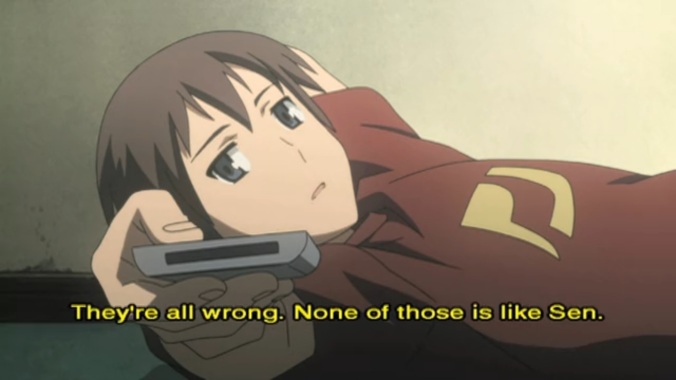

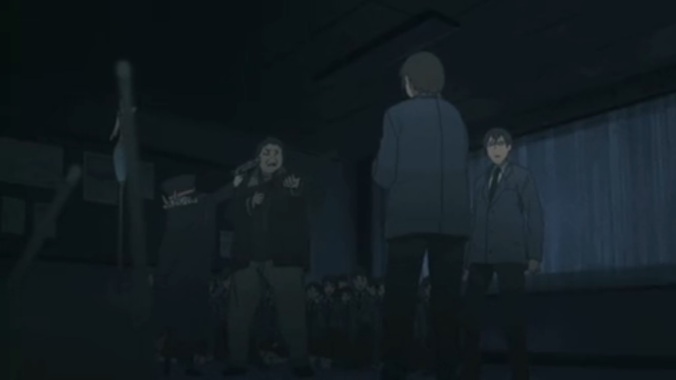


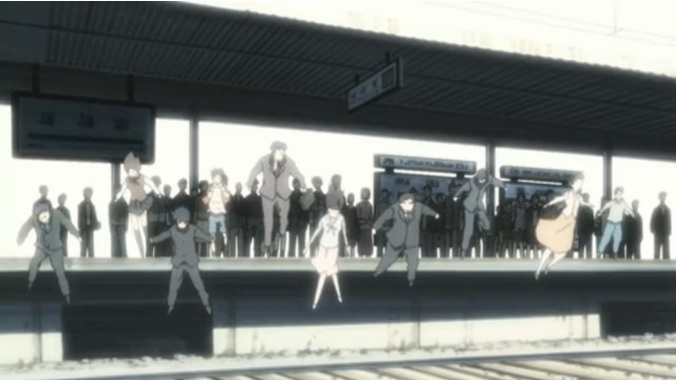




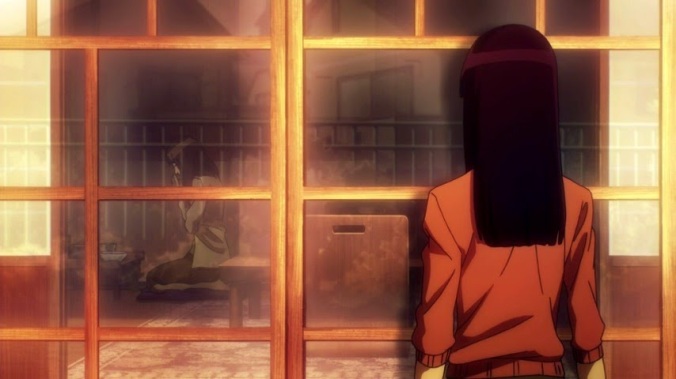

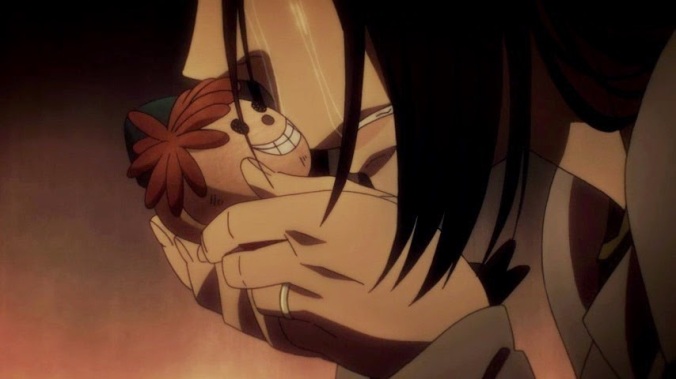
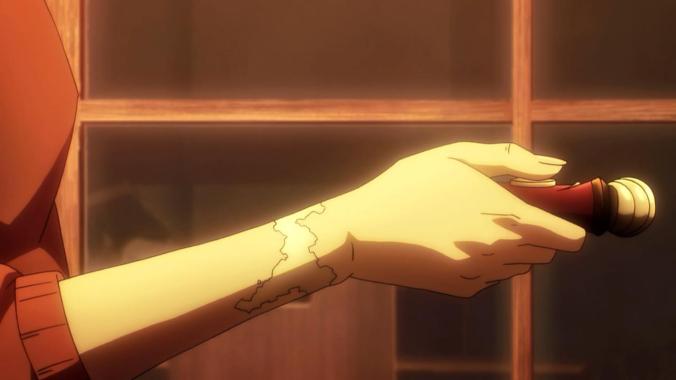














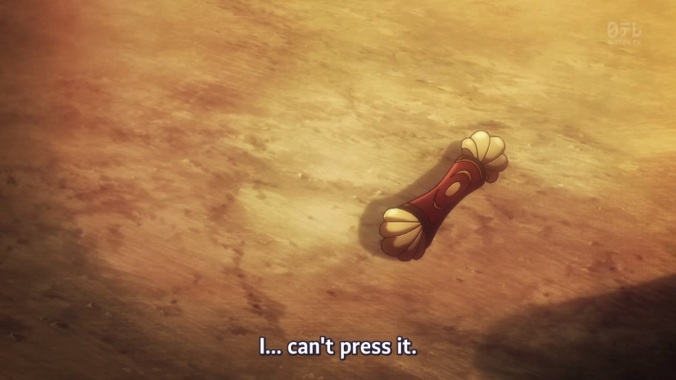


This piece is incredibly lacking in what it exhorts for, which is empathy, and lacks understanding of what it is discussing.
It’s exactly a piece written from outside looking in, very moralistic. *Extremely* insensitive, and damaging, even.
I’m not going to break down why, because it’ll make me mad. But I still felt it important to say so.
I obviously more agency to do things other than suicide that other people have to do other things at all save suicide. I went back and qualified my position. Still, I am a person who, depressed, has contemplated suicide before, but I do know that my personal experience with the issue is just one experience, and my conclusion partly draws from that one experience. I don’t think that perspective is invalid.
Damn, my head feels all fuzzy. I have a million and one things to say about this piece but before engaging in a response originating from false interpretations of the message(s) of this piece, I thought it’d be wise to seek clarification of said messages. I apologize in advance but some of these questions may be very argumentative. I’m still trying to organize my thoughts in a somewhat coherent response so if some (a lot) of my questions come off as obnoxious, I implore forgiveness.
> I’d accuse those commenters of lacking imagination…
> These commenters, however, seem to imply that that kind of hurt deserves much less merit, if any merit at all.
1) Isn’t this implying that one who lacks the imagination for emotionally responding to absurd situations, such as the one in Shigofumi, indicates he or she lacks empathy?
> She realized that the friends she made were ones she made through her passion for ice skating. Once she stopped skating, she noticed they weren’t around her like they always were.
> The time she used to devote herself to skating, she now spent, for the first time, consciously alone.
2) Similar interpretations but for the purposes of clarity, are you saying Chiyuki’s skating, including the aspects of her life that came with it (friends, self-pride, her family’s pride) served as a sort of gate separating her from possible suicidal thoughts? OR are you saying the nature of Chikyuki’s skating in how it dominated her life and her interactions with the people within it, inevitably *created* the extreme loneliness she felt upon its absence? (extra apologies for this run-on whopper)
>…what Death Parade was trying to illustrate in this scene was empathy, empathy in the face of callous assertions of personal freedom and maddening bouts of depression.
3) Are you saying Death Parade uses Chikyuki as a case study to show the regret felt by victims of suicide? And in doing so, inadvertently denouncing those who participate in the act as lacking empathy?
> If you’re absolutely sure that none of the people you care for will suffer, you sincerely and straightly believe that your current pain is worse than any of the potential pain you might inflict on people who care for you, or you don’t even care, then go on ahead. Kill yourself.
4) Do you believe there is a certain point for when the desire of the individual would outweigh the individual’s obligation to his/her society? Specifically, do you believe there is a line in regards to the justifiability of suicide, measured purely by the extent of self-misery rather than the misery of people around you?
5) Do you believe your interpretation of the show in regards to this message of empathy would’ve changed if Chiyuki had pressed the button?
1) I was getting at the point of how those particular commenters thought the message Shigofumi was trying to convey in the episode was illustrated in such an unlikely and absurd way that it was illogical to apply inductive reasoning. It strikes me as odd, considering how much fiction has used the fantastical to illustrate what said fiction’s authors believe to be general truths. I countered with an even more unlikely and absurd example in history to communicate that (1) it isn’t in the realm of impossibility and (2) you’re missing the point.
2) Both? The kinds of alienating thoughts she experienced were new and incredibly traumatic to her, and these thoughts were hitherto nonexistent when she was distracted with skating and friends. Because she never gradually grappled with these thoughts, she wasn’t able to develop the grounded considerations and mechanisms she would need to come to terms with them.
3) That’s what I’m getting at.
4) I don’t think individuals have any inherent obligations they have to follow. People construct obligations themselves and give them meaning themselves The question of whether people have a natural right to harm their own bodies is mu to me. People do it, and that’s it. Self-centeredness is different from natural rights though, and in this piece, I wanted to really grind down perspectives on suicide to the most personal level and have the relevant suicide victims and prospective suicide victims own up to what I believe is self-centeredness on their part by having them understand some of the less immediately obvious, but still devastating, consequences of their ultimate acts. If they understand that, then if they still want to kill themselves, sure. They’ll do it with the knowledge that they’re being selfish though.
5) I think the message would be more obscure and resounding, but it wouldn’t be necessarily be undermined. People might have more fuel to accuse it, all along, as a show that revels in illustrating how low human beings can go. The show would still represent a lack of empathy to be a bad thing because Chiyuki would self-destruct. Self-destruction is generally considered a bad thing.
1) Oops. By “commenters” I thought you were talking about were viewers who talked about the show. (Haven’t watched shigofumi yet. It’s now on my list though)
4) Ohhhhh I see. I was kind of thrown off during my initial reading of your perorative 2-line ending. It makes much more sense when seen as an aggressive warning directed at suicide victims.
One thing that still confuses me though is your differentiation of obligation and regard for devastating consequences. Aren’t they one and the same? If one has a regard for the consequences of an act such as suicide to people around him/her, isn’t it the same as being obligated to abstain from the act for the sake of these people? With reference to the loving father of Daiki and the loving family of Chiyuki, could they not be seen as morally obligated to his father or her family, people who’ve invested their time, money and love for the continued life and happiness of their child? This might be a stretch but could it not be argued that they are entitled to, not the life of but to the continued life of their child? This also ties into your argument of the negligence and self-centeredness of suicide victims who remain ignorant or choose to be ignorant of inherent obligations they, in my opinion, have to their inherent family.
The conception of duty (at least as how I see it) subordinates human feeling. There are obviously going to be cases where duty parallels desire, but to give you a counter-case example where the opposite happens, take one of the thematic threads in “13 Assassins” critical of duty. The thread is illustrated through a supposedly honorable vassal who serves his lord dutifully, despite the fact that his lord is a sociopath that butchers and mutilates innocent people for fun and whimsy.
You see how moral obligation becomes a real slippery slope there. It discourages the development of empathy. Even when empathy is developed, it prevents the person obligated from acting on that empathy, so empathy becomes useless at best and masochistic at worst. I don’t want to see people become slaves, even if your overseers have been kind to you. People, at least to me, should do things they want to, or do things that allow them to do things they want to. Respect and understanding of your friends and family almost always is something worthwhile to defer to, is something that in many cases you should defer to, but deference should be done out of personal desire instead of duty.
I’m kind of messed up right now and don’t know what to say honestly. I watched Death Parade, and I can say, this story held me up more than once to do something stupid. I guess you’re kind of blunt, but kind of right too. Especially on the case that if we’re gone, we’re gone…
When I was taken by suicidal thoughts, I always had a thought for Chiyuki or Yousuke the man from the 4th episode. Especially his gaze before he kill himself. I wondered if I looked this way too.
I don’t know if there have any afterlife. But I know that I wouldn’t want to look like Chiyuki and Yousuke if I ever done the same.
To me the Quindecim is the place where all end… so you better come here without regret, like Sachiko did. I want to finish my life this way.
I’m sorry to hear that’s something you’re going through. If my post gave you any comfort, great. That said (and I don’t really know your personal circumstances), you should try to see a therapist about this.
Thanks for sharing a little about yourself though. I appreciate your thoughts.
So I’m a bit late to the party… however I just re-watched Death Parade for the nth time and I was googling to see if the creator was in fact depressed himself because of the intimate way that he depicted it.
Both of the characters with in the series have similar reasoning to kill themselves, they were overwhelmed with life. The boy, Yousuke, played a lot of video games and Chiyuki ice skated as forms of escapism.
Yousuke had lost his mother and likely felt that his father wasn’t thinking of him when he remarried which meant that he would have pulled away from his family and we never saw any friends which leads me to believe that he felt very alone, he also did play a lot of video games which meant that it was likely he didn’t have any real ‘skills’ or at least none that society would thank him for which made him feel useless, he was young and at a point in his life where he had to choose what he wanted to do for a career but was having a hard time figuring out what that could be. The look that he gives before he jumps says more to me that he feels like a burden on the people around him and that they would do better if he wasn’t there.
Chiyuki’s life was all about ice skating, that’s simply how she spent her time and it was the only time I think she ever really felt alive. When she lost that she said that she simply felt nothing, numb. She was also confused about where she was going and it’s likely that since ice skating was her entire life that her friends and family drew away not intentionally but simply because they didn’t necessarily know what to say, how do you empathize with someone who doesn’t feel? She noticed this and further isolated herself knowing that they wouldn’t understand. Her mothers attempts at helping only made her feel more like a burden on her. Her ice skating was her life after all, what could she possibly do instead? What was the point of living if all you are doing but taking up space?
So I think that both of their deaths come from a place of empathy for the people around them but it’s a dark empathy one that’s mixed with placing no value on yourself. All of the people I’ve known who have been suicidal including myself have all found that being in that head space it was the people around you that made you want to do it and the people around you who made you want to live. It’s a very difficult place to be in and I think that Death Parade is shining a light on that.
Death is never easy or clean and understanding that just because you think someone feels a certain way doesn’t mean that they do. People are often more likely to believe their own versions of what is going on that they forget to stop and actually talk to the other person. I think it’s impossible to know that taking your life will not cause suffering for somebody else, people tend to place meaning in odd places, if I see somebody at a shop consistently and then they disappear very suddenly and later find out they killed themselves I would be truly saddened. You just don’t know how you can effect perfect strangers by going about your daily business.
I do think that people have the right to hurt or kill themselves but I think that most people who actually commit suicide aren’t doing it for themselves. Like all of the most horrible acts around the world people are more likely to do them if it’s for someone else. Sure there are people who are lacking in empathy who are capable of doing them and those are the people who would do horrible acts for self gain (so probably not suicide) but most people are thinking of their families or their friends or even for the betterment of humanity. Look at the stories of some of the most decorated war veterans, they’re either clearly unhinged or they were doing it out of love. It sounds cheesy but I genuinely do think that love is more powerful than hate. You can even look at Hitler and argue that he believed he was doing something good, doing something to help humanity and we all know the appalling acts that he ordered to be carried out.
People are very complex, I don’t think that anybody is purely good nor evil and I really appreciate Death Parade for really showing that at the end of the day everyone does have that glimmer of good in them even if they’ve murdered people or if they abuse others, that everybody sits firmly in a very grey middle ground because right and wrong really depend on the person (or people) who’s judging the matter at hand. It’s very rare to have a show really explore these kinds of things and they did a very good job in doing so, even their ‘heaven’ and ‘hell’ sit in that ambiguous area.
To conclude my ramblings before they end up going on forever, I believe that Death Parade is a message of promoting empathy and communication in difficult times along with valuing ALL human life including your own. These three things can prevent disasters like World War I and World War II (which started as a result of World War I, who knew one life taken could result in millions more?).
Thanks for the extended comment. Ramble or not, I appreciate your different perspective on Death Parade.